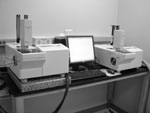New thermal equipment available for lab use
With the help of the dental infrastructure fund, Xuejun Wen, M.D., Ph.D., assistant professor of Bioengineering, Cell Biology and Anatomy, Clemson-MUSC Bioengineering Program, and his colleagues recently obtained new thermal analysis equipment now available for use by anyone in the university. Thermal
analysis equipment.
Thermal
analysis equipment.
The set of Mettler Toledo thermal analysis instruments contains two modules: one differential scanning calorimeter module (DSC 822e) and one thermo gravimetric analysis/simultaneous differential thermal analysis module (TGA/SDTA 851e). Both are equipped with robotic sampler loaders for high throughput applications. The equipments also come with a complete set of STARe thermokinetic analysis software.
The DSC module measures the heat flow in and out of samples as they are subjected to a temperature profile. The heat flow is indicative of phase changes. The operating temperature range for this module is –150 °C to 700 °C.
This equipment can measure the calorimetric properties, such as heat capacity, of a sample as a function of temperature. Samples can be a natural or synthetic biomaterial, a drug, or a biomolecule, such as protein, lipid, nucleotide, etc.
The following are examples of applications related to biomedical research:
- Establish two-component phase diagram of the mixture of two materials, drugs, or macromolecules, such as drug delivery system and drug formulation.
- Investigate glass transition temperature, crystallization temperature, melting temperature, solid-solid transitions, oxidative stability, polymorphism, degradation of biomaterials and cross-linking and the degree of cure of thermosetting biomaterials.
- Examine stability, domain structure, folding intermediates, oligomerization and interactions of proteins and nucleic acids, membrane structures, dynamics, and transport, temperature-induced transitions of lipids/membrane system, and half-life of low molecular weight compounds.
- Study drug-protein/DNA/membrane interaction.
- Thermal behavior change of tissue/cells/biomolecules, for example, thermal denaturation protein structure can be used as a probe useful for the study of damaged tissues.
Wen’s lab currently uses the DSC module to characterize: thermal
behaviors and degradation of several biodegradable materials newly synthesized
in the lab for tissue engineering applications, nano-/macro-particle and
liposome based drug delivery systems, thermal behavioral changes of cells/tissues/biomolecules
under different environmental conditions; and thermal denaturation of proteins
in engineered tissue.
The TGA/SDTA module records mass loss and the temperature difference between an unknown sample and a reference sample in the same environment during a programmed time and/or temperature profile. The operating temperature range is from room temperature to 1100 °C. Changes in mass indicate mass loss and phase changes which occur at set temperatures indicative of the compound. A variety of atmospheres can be employed during the analysis.
Here are some examples of applications related to biomedical research:
- Detect residual solvent in amorphous and crystalline solids.
- Characterize the surface coating.
- Examine the weight percentage of each component in a mixture.
- Study the adsorption property of a substrate.
For more information, contact Wen at 792-5875 or e-mail xuejun@musc.edu.
Friday, April 1, 2005
Catalyst Online is published weekly, updated
as needed and improved from time to time by the MUSC Office of Public Relations
for the faculty, employees and students of the Medical University of South
Carolina. Catalyst Online editor, Kim Draughn, can be reached at 792-4107
or by email, catalyst@musc.edu. Editorial copy can be submitted to Catalyst
Online and to The Catalyst in print by fax, 792-6723, or by email to petersnd@musc.edu
or catalyst@musc.edu. To place an ad in The Catalyst hardcopy, call Community
Press at 849-1778.